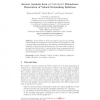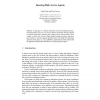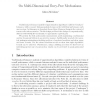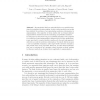121
click to vote
ALDT
2009
Springer
14 years 12 months ago
2009
Springer
Abstract. We axiomatically characterise a class of algorithms for making sequential decisions in situations of complete ignorance. These algorithms assume that a decision maker (DM...
ALDT
2009
Springer
15 years 6 months ago
2009
Springer
We study the problem of allocating a set of indivisible goods to a set of agents having additive preferences. We introduce two new important complexity results concerning efficienc...
102
click to vote
ALDT
2009
Springer
15 years 6 months ago
2009
Springer
We study the problem of allocating a set of indivisible items to players having additive utility functions over the items. We consider allocations in which no player envies the bun...
ALDT
2009
Springer
15 years 6 months ago
2009
Springer
In this article we develop an indirect approach for assessing criteria significance weights from the robustness of the significance that a decision maker acknowledges for his pai...
132
click to vote
ALDT
2009
Springer
15 years 6 months ago
2009
Springer
Abstract. We study a model in which a group of agents make a sequence of collective decisions on whether to remain in the current state of the system or switch to an alternative st...
121
Voted
ALDT
2009
Springer
15 years 8 months ago
2009
Springer
Abstract. In this paper we explicitly model risk aversion in multiagent interactions. We propose an insurance mechanism that be can used by risk-averse agents to mitigate against r...
123
click to vote
ALDT
2009
Springer
15 years 8 months ago
2009
Springer
Aggregating preferences for finding a consensus between several agents is an important issue in many fields, like economics, decision theory and artificial intelligence. In this...
108
click to vote
ALDT
2009
Springer
15 years 8 months ago
2009
Springer
Traditional performance analysis of approximation algorithms considers overall performance, while economic fairness analysis focuses on the individual performance each user receiv...
138
click to vote
ALDT
2009
Springer
15 years 8 months ago
2009
Springer
This paper is devoted to sequential decision problems with imprecise probabilities. We study the problem of determining an optimal strategy according to the Hurwicz criterion in de...
114
click to vote
ALDT
2009
Springer
15 years 8 months ago
2009
Springer
Abstract. Argumentation has been acknowledged as a powerful mechanism for automated decision making. In this context several recent works have studied the problem of accommodating ...




